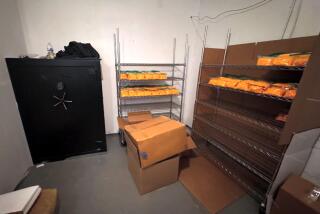1,300 Tapes Seized From Store Are Counterfeits, Authorities Say
- Share via
Almost 1,300 counterfeit audio cassette tapes were seized from an Oxnard video store in what may be the largest such case ever in Ventura County, authorities said Monday.
Oxnard Police Officer Bryan MacDonald said he and a recording industry investigator confiscated the tapes, which are worth an estimated $11,500, from the Rose Video store at 107 S. Rose Ave. on Sunday.
Store manager Noe Ramirez Garcia, 36, of Sepulveda was arrested on suspicion of selling fraudulent goods, MacDonald said. Garcia was later released on his own recognizance from the Ventura County Jail, a jail spokesman said.
The tapes were discovered by Ralph Vaughan of the Recording Industry Assn. of America, a trade organization based in Washington, D.C.
Vaughan has helped Oxnard police on some smaller cases in which vendors from the Los Angeles area were selling counterfeit tapes from carts in Oxnard’s Colonia neighborhood, where vendors regularly hawk their wares, MacDonald said.
Vaughan flew to Oxnard last weekend “to see what he could dig up,” MacDonald said.
“Lo and behold, there they were.”
When Vaughan entered the video store, he discovered the counterfeits of MCA and Capitol brand recordings of Latino music set up on card tables in the middle of the store, MacDonald said.
He then asked police for assistance.
Vaughan returned to the store and bought two cassettes from Garcia, who runs the store his girlfriend owns. MacDonald then arrested Garcia.
MacDonald said it appeared Garcia had been approached by a man out of the Los Angeles area about selling the tapes.
“We’re an offshoot of L.A.’s problem,” MacDonald said. “This is a distribution point.”
Deputy Dist. Atty. Ronald C. Janes of the Ventura County district attorney’s office said that although the seizure is probably the biggest case of its kind in the county’s history, the crime is rare in the county.
The Oxnard store was one of four Southern California locations where allegedly counterfeit tapes were discovered by industry investigators during the week, said Steve Donofrio, senior vice president of the Recording Industry Assn. of America.
Investigations also took place in Los Angeles, San Diego and a San Bernardino factory where 9,000 completed tapes were found, he said.
Another 16,000 tapes in various stages of completion also were seized there, he said.
Donofrio said that 40% of all counterfeit tapes are made in California. The Los Angeles area is the primary manufacturing center, he said.
Industry analysts estimate that they are losing several hundreds of millions of dollars a year because of the thriving counterfeit tape business, Donofrio said.
Counterfeiters buy legitimate cassettes of popular records and use them as masters. With high-speed tape duplicators, they can make up to 20 cassettes a minute, Donofrio said.
They then use a stamp to print information on the cassette. They also photograph the cardboard insert listing the songs from the original and use it to make a counterfeit label.
Although the color quality on the fake label is poor, consumers often do not know they are buying a counterfeit tape, Donofrio said.
Most people do not own sophisticated enough stereo systems to hear the difference in sound quality between the bootleg cassettes and the originals, he said.
“They don’t think it’s wrong or a duplication,” Donofrio said. “They just think they’re getting a good deal.”
On the streets, the tapes may sell for about $3, luring customers who would rather take the deal than pay $7 to $10 for a legitimate tape, Donofrio said.
In the past, the tapes have been found at flea markets. Now they are emerging on the streets or in shops in low-income areas, where buyers are eager for the deals, Donofrio said.
Manufacturers sell the counterfeit tapes to retailers for about $2, making $1 or more profit on each tape, Donofrio said.
They do not have to pay the royalties to the artist, promotion for records or royalties to writers, as legitimate recording companies do.
More to Read
Sign up for Essential California
The most important California stories and recommendations in your inbox every morning.
You may occasionally receive promotional content from the Los Angeles Times.













